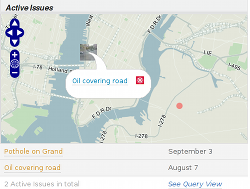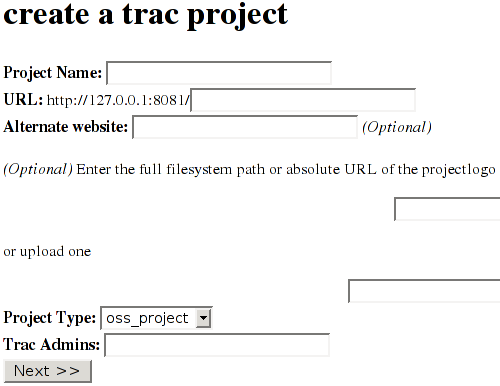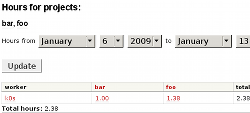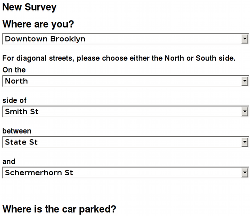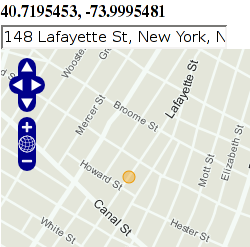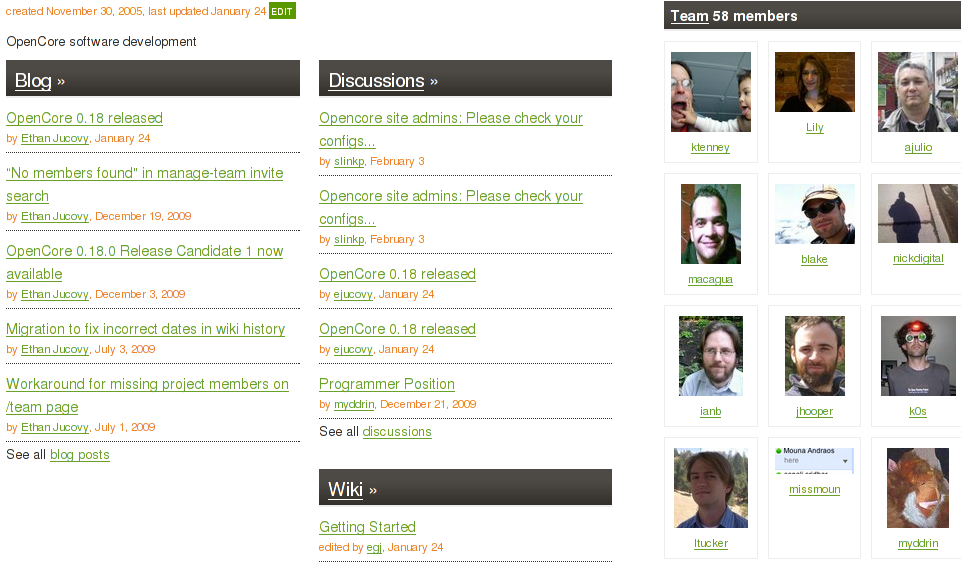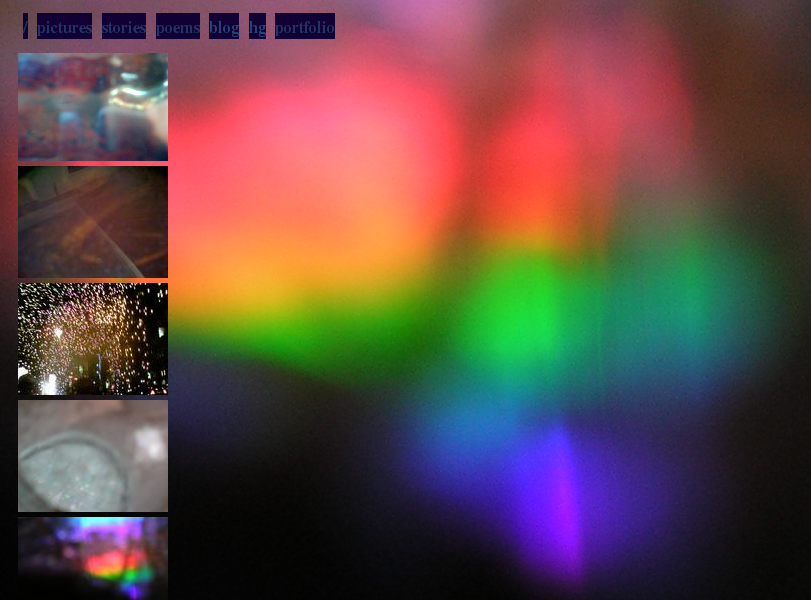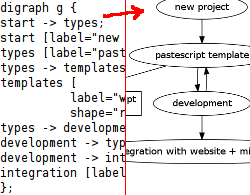As a software engineer for
Automation and Tools team,
I have help to develop a variety of tools, harnesses, and libraries, a few of which are
highlighted below.
In addition to work found in
Mozilla's mercurial repositories
and its github repositories,
examples of my Mozilla related work may be seen at
http://k0s.org/mozilla/hg and in
toolbox.
Web resoures are also available at
http://k0s.org/mozilla/.
Fall 2011 - present
Mozbase is a project for the development of best of breed python packages for
the support of test harnesses and tools related to Mozilla products such as the
Firefox web browser. Utilities include profile and addon management, process launching,
unification of system information, and test manifests.
Spring 2010 - Summer 2011
Mozmill is a tool for automating Gecko-based applications such as Mozilla
Firefox
for use as a test harness.
August 2006 - January 2010
The Open Planning Project
I worked as a software engineer for
The Open Planning Project
and have undertaken several software projects in that role,
primarily web applications using
python and supporting tools.
January, 2010
PHP phonebook
Implemented and deployed a
PHP phonebook
for TOPP's
FreePBX phone system.
The software interfaces with the smart phone as well as the web interface
and MySQL
backend so that each employee could keep a permanent
phonebook.
Summer 2009
Developed a
demonstration mapping application using a webob view and OpenLayers.
The goal of the project was to provide an example platform
for encapsulation of mapping best practices for geolocation
and use of OpenLayers.
The tiles were provided by a
GeoServer instance
and
geopy
was used for
geolocation
of addresses.
demomap practices were built on and
extended in the development of
GeoTrac.
Summer + Autumn 2009
whatsup
is an outage escalation and site contact information tool.
Web sites and associated metadata, including who is in charge of
the sites, are read from
.ini files using martINI.
LDAP
was used
both for authentication as well as for contact data.
Users could update a subsection of their LDAP entry through the
web interface.
whatsup is
intended as a front end for simple presentation of who is responsible
for what site as well as how to report site outages.
Utilities were planned for interaction with monitoring tools,
issue trackers, and planned site outage tools.
Autumn 2008
listen is a
plone
mailing list
product which is
used by opencore.
I worked on implementing a UI redesign and
fixing and testing the import/export facility, amongst
other interaction with the software.
Spring 2007 - Spring 2008
opencore is a web-based
collaborative workspace for community organizing,
featuring wikis, mailing lists, blogs,
task tracking,
and team management. opencore
is built on Zope
and plone technologies.
In addition to general work on opencore,
I have taken a key role on producing some parts of the software:
-
Account: authentication, account registration workflow,
and password retrieval views and controllers
were written and tested
- Project Summary Page: using
Zope
interfaces and adapation, wikis, blog posts,
mailing list messages, and team members were transformed
to feed items which were presented on a project's summary page
and presented as
RSS and
Atom.
Spring 2007
topp.build
build and deployment
system for opencore and other
TOPP software
using
buildit;
deprecated by fassembler, no longer maintained
Winter 2006
contactthem
Sample pylons application to retrieve the contact information of government representatives given an address.
No longer maintained.
Autumn 2006
membrane
and
remember are
plone products for authentication.
membrane
provides pluggable
authentication service plugins,
and
remember is
a reference implementation of a plone member object.
My work consisted of implementing password salting and hashing
using
bcrypt
and various other work.
Both products are used by
by opencore.
Python Packages
I have also developed on my own time several pieces of software
as part of building my website
or just for fun because coding is enjoyable.
Stable versions of these packages may be found on
the cheeseshop and the
source is hosted at my mercurial repository.
Many of these are webob views.
I love collaboration, so while I don't have nearly as much time
to flush out these projects as I would like, if you'd be interested
in working on any of these projects with me,
I'd love to hear from you!
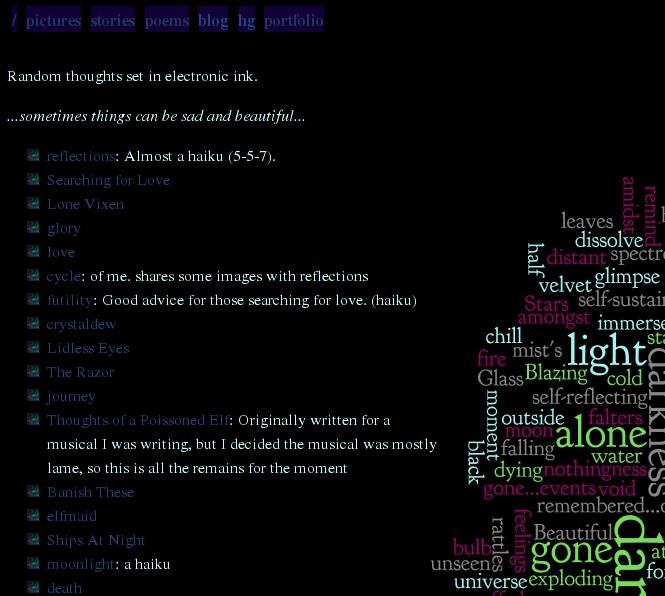
dynamic index listing generated by decoupage
decoupage is a webob view
that allows customizable
generated index files for conceptual directories.
The index files are
genshi templates which
can be overwritten on a per-site and per-directory basis.
decoupage includes
pluggable formatters
using
setuptools entry points
that allow for the manipulation
of template data prior to rendering.
decoupage uses martINI
to process the .ini files used for its configuration.
decoupage is a main component of k0s.org,
as explained in
the page about this site.
decoupage utilizes
contenttransformer to
adaptively serve static files.
montage is a decoupage
formatter plugin for displaying image
galleries controlled by the /image keyword in
decoupage .ini files.
montage utilizes
cropresize
for thumbnail creation if specified in the configuration.
Several templates
are included to allow images to be displayed in a variety of contexts.
contenttransformer
enables transformation of content of one type into content of
another type via pluggable transformers.
Some transformers are included with contenttransformer:
- Graphviz
-
transforms graphviz
dot files
into PNG images
- ReST
-
transforms
reStructuredText
to HTML
Though many more can be imagined or you can write your own to plugin to the
[content_transformers] entry point.
cropresize
uses PIL to crop and resize an image as appropriate for web presentation. cropresize is a convenience package that allows image resizing without aspect ratio distortion.
bitsyblog is a
minimalist blog using genshi templates. Blog entries are stored as files on the filesystem with a
datestamp and according to the permissions set by the blogger
(public, secret, or private). In addition to a web interface,
bitsyblog features a command line blog program.
manage redirects through the web in
WSGI
middleware. It is more of a
vision at this point, but I hope
to fill in that vision as time permits.
smartopen provides a system of pluggable handlers to convert input
to URLs. I use this as bound to a
fluxbox
key stroke
to open what is on my X
clipboard, but other applications could be an IRC bot plugin
or a TTW tool to guess links. Each handler checks to see if the
input matches its link, and open it in
Firefox
or do other processing as dictated by command line options.
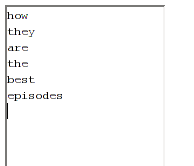
Example wordstream output.
Odd-number lines are from the wordstream program
wordstream is a corpus of text associations with web and command line
applications to interact with the associations. One interface,
wordstream, allows direct interaction with the corpus from the
command line or a browser (using jQuery AJAX functions to fetch the
words). Another interface, dissociate, scrambles a set of
text and rearranges like emacs'
M-x dissociated-press.
Feeding the corpus text will grow a stack of left to right word
associations on a per word basis.
The corpus can then be eaten: given a word, pop the top of its stack.
PasteScript Templates
PasteScript provides a
pluggable file template system
for the easy initialization of
python
and other file-based projects.
I have created PasteScript templates to aid in my code development and also use PasteScript's template module an engine for
TracLegos.
PasteScript templates play an important part in my
software development process.
Best practices and example usage may be encapsulated in the templates,
and lessons from development may be backported as appropriate to
iteratively improve the process of software development.
The webob_view template deploys
a simple dispatcher system using webob that makes it easy to write small web applications.
console_script
a template to create applications with a command line entry point

